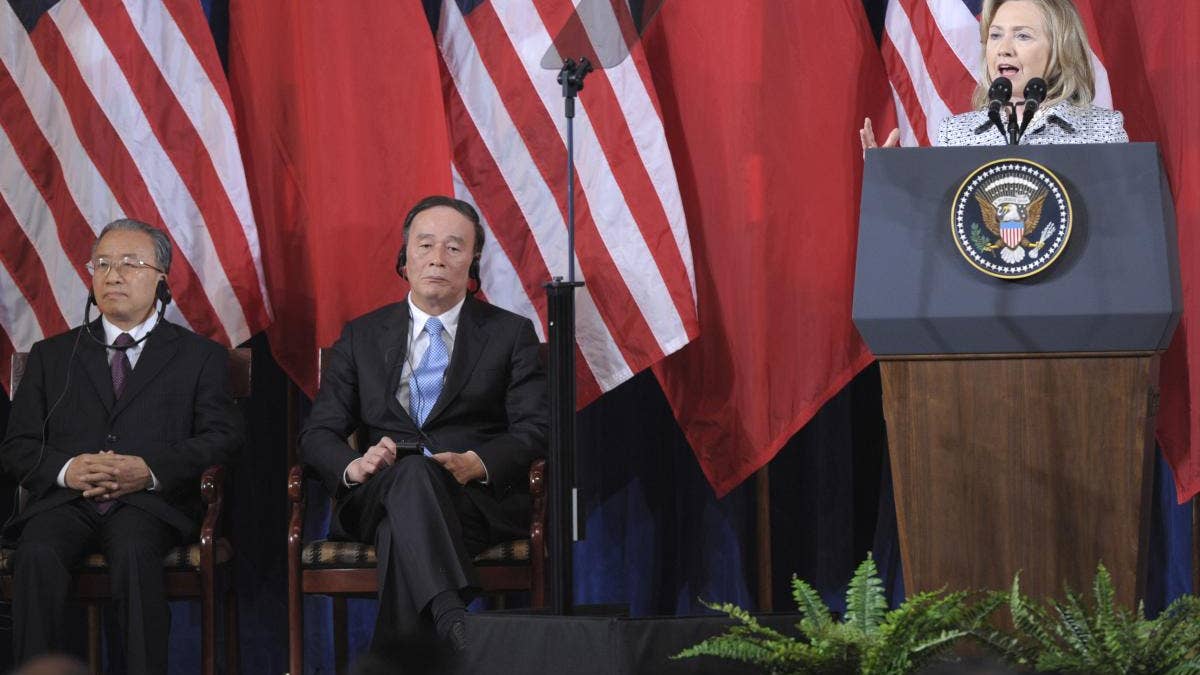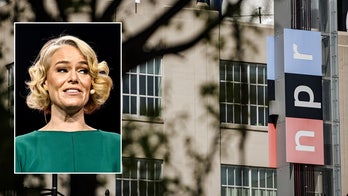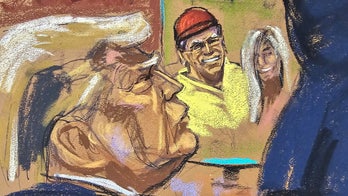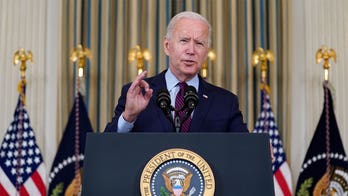
Secretary of State Hillary Rodham Clinton speaks as Chinese Vice Premier Wang Qishan, center, and Chinese State Counselor Dai Bingguo, left, listen during the opening session of the joint meeting of the U.S.-China Strategic and Economic Dialogue (S&ED), Monday, May 9, 2011, at the Interior Department in Washington. (AP Photo/Susan Walsh)
When the motorcade of Chinese State Councillor Dai Bingguo pulled up in the horseshoe driveway at State Department's C Street entrance this morning, Secretary of State Hillary Clinton was there to greet him. She cheerfully made small talk about the pleasant weather, then guided the septuagenarian Dai to the mark where the two paused to shake hands for photographers.
The scene emphasized the importance of the bi-lateral relationship between the two countries, which collectively account for one-third of the world's gross domestic product - but also the strong degree of stage management present in this, the third round of the "Strategic and Economic Dialogue" that the U.S. and China introduced in 2009.
Originally intended as a new forum in which the nations' top diplomats and financial officials could engage each other, the S&ED was expanded this year, for the first time, to include senior military leaders from both sides.
As always, the welcoming remarks brimmed with expressions of mutual admiration, pledges of future cooperation, and acknowledgments that there will always be areas in which the two countries "disagree." Primary among the latter, now as in years past, are the areas of human rights and China's manipulation of its currency, the Remnimbi (or yuan).
Vice President Biden, in his singular style, addressed the former issue with language seldom employed by the staid diplomats of C Street. "Now, look," the vice president said, towards the end of his remarks at the opening session, "I recognize that some in China see our advocacy as human rights as an intrusion, and Lord only knows what else. But President Obama and I believe strongly, as does the secretary, that protecting fundamental rights and freedoms such as those enshrined in China's international commitments, as well as in China's own constitution, is the best way to promote long-term stability and prosperity of any society."
Secretary Clinton had earlier made the same point by obliquely invoking this year's series of revolutions in the Mideast. She clearly intended the example as a warning to the Chinese, who, in the wake of those upheavals, have launched another security crackdown on their own soil.
"We see reports of people [in China], including public interest lawyers, writers, artists and others who are detained or disappeared," Clinton said. "And we know over the long arc of history that societies that work toward respecting human rights are going to be more prosperous, stable and successful. That has certainly been proven time and time again, but most particularly in the last months."
While the U.S. officials all trotted out favorite Chinese aphorisms to underscore their main themes - mutual interdependence, optimism, and so on - only Treasury Secretary Timothy Geithner was brave enough to attempt the phonetic Chinese pronunciation of the maxim he invoked.
Yo fu tongsian, yo nan tongdan, he said (roughly), which translates into English (roughly): "Share fortunes together, meet challenges together."
For their part, the Chinese delegates, long accustomed to sitting through American remonstrations on human rights and currency issues, did not respond in kind. That they had already done last month, when, in response to the release of the State Department's annual report on the status of human rights in the rest of the world's nations, the Chinese issued their own report on the status of human rights in the United States.
That report had taken Washington to task for trumpeting the need for Internet freedom around the world while seeking to clamp down on the posting of classified cables by the anti-secrecy group WikiLeaks. ""We hereby advise the U.S. government," Beijing said, "to take concrete actions to improve its human rights conditions, check and rectify its acts in the human rights field, and stop the hegemonistic deeds of using human rights issues to interfere in other countries' internal affairs."
This morning, the delegates patiently listened and replied only with bland, mutually convenient answers. Councillor Dai said that at the age of seventy - "I may not look that old," he quipped - he was forswearing quality time with his grandchildren in order to work towards a better world with one of China's most important partners. Then he encouraged Americans to visit China, so they could see for themselves "the enormous progress China has made in various fronts, including in human rights."
In the nearly 6,000 words spoken in the opening session, the word "currency" was never uttered.




